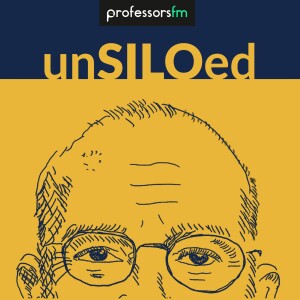
A lot of the smart and successful people in the business world are very good at achieving extrinsic goals of success, fame, money and power. But those types of people are not necessarily very good at the intrinsic goals of happiness, building great relationships, having a sense of ease about life and pursuing meaning.
Raj Raghunathan is a Zale Centennial Professor of Business at the McCombs School of Business at The University of Texas at Austin. He is interested in exploring the impact that people’s judgments and decisions have on their happiness and fulfillment, and writes about his views on happiness, creativity, and leadership on his popular Psychology Today blog Sapient Nature.
His six-week long Coursera course on happiness called A Life of Happiness and Fulfillment currently has over 350,000 registered students from 196 countries. He has also written a book called “If You're So Smart, Why Aren't You Happy?”
In this episode, hear Greg and Raj talk about the substitution of intermediate metrics for final metrics, the abundance mindset, and whether or not givers are more likely to succeed.
Episode Quotes:Can you be happy if you don't reach your goals / find a sense of belonging?
I do think that you can. And I think a lot of it involves gaining this, what I call the Abundance Mindset at the end of the book. And basically it is to focus on the part of the glass that's half full basically.
So everyone's life has problems. Everyone's life has also good things going on. And which of these two things do we predominantly focus on? Are we constantly focusing on the problems and trying to tackle them and address them? Or are we also taking some time to be thankful for all the things that are going positively in our lives? And the argument here is that the more you are focusing on the things that are going well in your life, or at least taking some time every day to appreciate the good things in your life, the less desperate you're going to be for many things.
Happiness can help you achieve your goals
There is a relationship between being happy and those conventional yardsticks of fame, money, power, et cetera in that happier people are more likely to achieve those goals anyway. And so it's a win-win strategy to prioritize happiness because not only do you get to increase the goal that everyone is ultimately after, but it also ends up enhancing your chances of achieving those goals that you thought would lead to happiness.
What makes people happy?
That level of authentic seeking of the truth to what really is the determinant of happiness, as opposed to the fake determinants of happiness I think is a very important starting point. And in a way I think that in this grand dance, we have come to a situation in which a lot of the things that we assumed would make us happier - namely, more comfort, more ability to travel and living in richer homes and et cetera - I think a higher number of people than was ever the case in the past are discovering it as a personally experienced truth that more of those things don't make me happier. And so we have more of the authentic seekers I feel now than used to be the case.
Guest Profile:
- Faculty Profile at The University of Texas at Austin
- Raj Raghunathan on Linkedin
- Raj Raghunathan on Twitter
- Raj Raghunathan on TEDxDelhi
- Raj Raghunathan on Coursera
- Happy Smarts Website
- Happy Smarts on Youtube
His Work:
- Raj Raghunathan on Google Scholar
- Blogs on Psychology Today
- If You're So Smart, Why Aren't You Happy?
More Episodes
 2024-03-08
2024-03-08
Create your
podcast in
minutes
- Full-featured podcast site
- Unlimited storage and bandwidth
- Comprehensive podcast stats
- Distribute to Apple Podcasts, Spotify, and more
- Make money with your podcast
It is Free
- Privacy Policy
- Cookie Policy
- Terms of Use
- Consent Preferences
- Copyright © 2015-2024 Podbean.com






